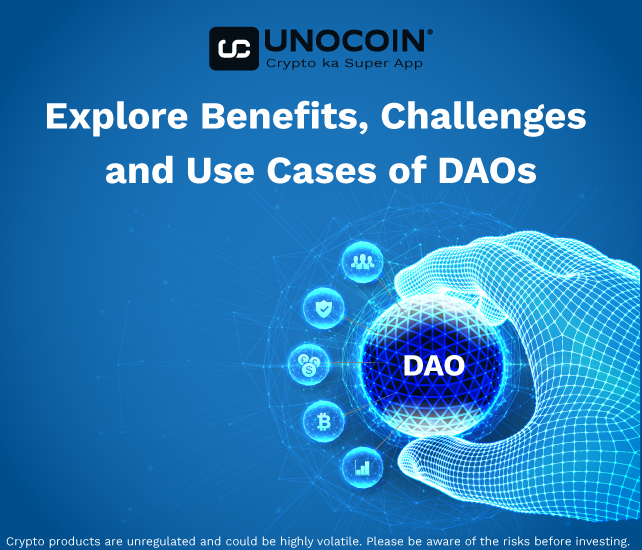DAOs (decentralised autonomous organisations) are a type of organisation that operates through the blockchain, allowing participants to make collective decisions through a consensus mechanism without the need for a central authority. DAOs have been gaining traction recently, especially in the crypto industry. Here are some of the benefits, problems, and use cases of DAOs:
Advantages of DAO:
Decentralisation:
DAOs eliminate the need for a central authority or intermediary, making them more decentralised and democratic. This means that everyone in the DAO has an equal say in decision-making, regardless of their status or position.
Transparency:
DAOs operate on a public blockchain, which means that all transactions and decisions made within the organisation are transparent and publicly accessible to anyone.
Efficiency:
DAOs use smart contracts to automate decision-making, making it faster and more efficient than traditional organisations.
Trustless:
DAOs operate on trustless systems, meaning there is no need to trust a central authority or intermediary to make decisions or enforce rules.
Accessibility:
DAOs are accessible to anyone with an internet connection, allowing for global participation and the ability to pool resources from around the world.
DAO Challenges:
Complexity:
Setting up and running a DAO can be complex, requiring a deep understanding of blockchain technology and smart contract programming.
Governance:
DAOs require effective governance mechanisms to ensure that decisions are made fairly and democratically, which can be difficult in practice.
Security:
DAOs are vulnerable to security threats such as hackers and cyber-attacks, which can lead to loss of funds and damage to the organisation’s reputation.
Legal and regulatory issues:
DAOs operate in a legal grey area and their operation and governance are not sufficiently clear.
Scalability:
DAOs currently have limited scalability, with some networks experiencing congestion and slow transaction times during periods of high activity.
DAO use cases:
Decentralised Finance (DeFi):
DAOs are widely used in the DeFi space, allowing users to pool their resources and make collective investment decisions.
Social organisations:
DAOs can be used for social organisations such as charities and non-profits, allowing transparent and democratic decision-making and distribution of funds.
Game and virtual worlds:
DAOs can be used in-game and virtual worlds, allowing for decentralised decision-making about the development and management of these worlds.
Supply chain management:
DAO can be used in supply chain management, enabling transparent and efficient decision-making on the production and distribution of goods.
Artistic and creative projects:
DAOs can be used in artistic and creative projects, allowing for democratic decision-making on project funding and development.
In conclusion, DAOs offer a number of advantages such as decentralisation, transparency and efficiency, but they also come with their own set of challenges such as complexity, governance and security. Despite these challenges, DAOs have many potential use cases, and we will likely see more DAOs emerge in the future as technology evolves.
Please find the list of authentic Unocoin accounts for all your queries below:
- YouTube Channel: https://www.youtube.com/c/Unocoin/videos
- Newsletter: https://medium.com/subscribe/@Unocoin_growth
- Blogs: https://blog.unocoin.com
- Instagram: https://www.instagram.com/unocoin/
- Twitter: https://twitter.com/Unocoin
- Facebook: https://www.facebook.com/unocoin/
- LinkedIn: https://in.linkedin.com/company/unocoin
- Telegram Group: https://t.me/Unocoin_Group
- Telegram Channel: https://t.me/+fasQhTKBsfA5N2Zl
- Telegram: https://t.me/UnocoinSupport_Bot
- E-mail id: [email protected]
- Contact details: 7788978910 (09:30 AM IST – 06:30 PM, Mon – Sat)
- App store link: https://apps.apple.com/us/app/unocoin/id1030422972?ls=1
- Playstore link: https://play.google.com/store/apps/details?id=com.unocoin.unocoinwallet
Disclaimer: Crypto products are unregulated as of this date in India. They could be highly volatile. At Unocoin, we understand that there is a need to protect consumer interests as this form of trading and investment has risks that consumers may not be aware of. To ensure that consumers who deal in crypto products are not misled, they are advised to DYOR (Do Your Own Research).




